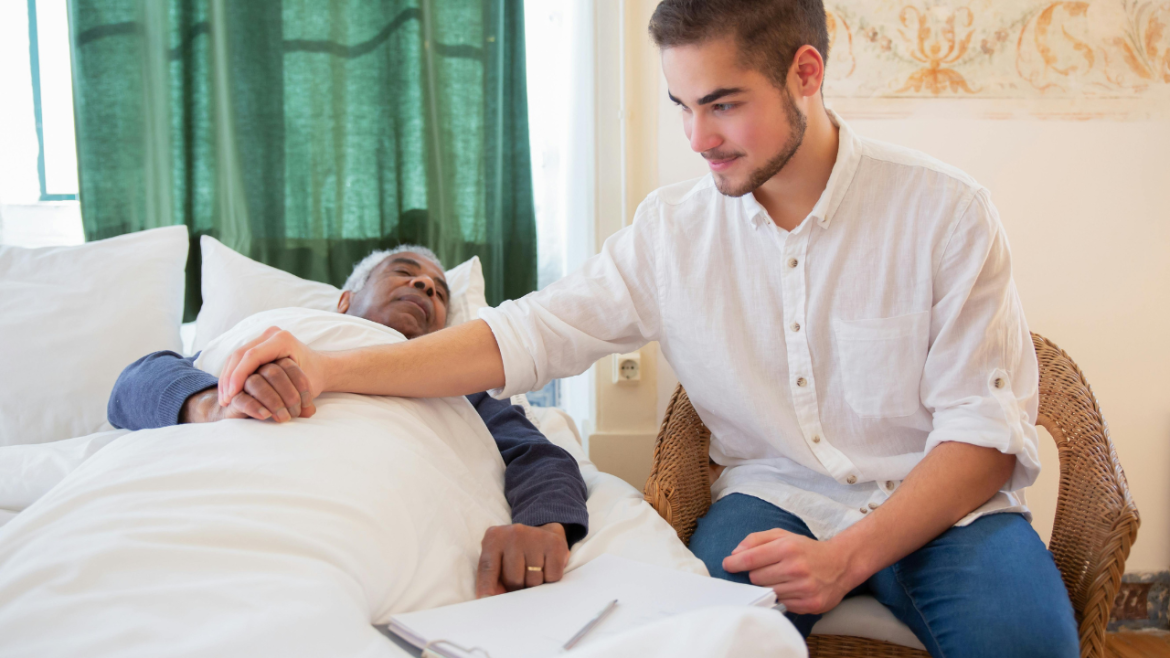Did you know that Leading Edge Senior Care has a Dementia Support Group? We meet monthly in Mesa. For more details <click here>
What Seniors Need To Know About Lymphedema
Lymphedema is a chronic condition that affects millions of people, particularly seniors. It occurs when the lymphatic system, which plays a crucial role in immune function and fluid balance, becomes compromised. The result is fluid buildup, leading to swelling, most commonly in the arms and legs. This condition is more than just an inconvenience; it can significantly impact mobility, comfort, and overall health.
For seniors, lymphedema presents unique challenges. The aging body already faces changes in circulation, skin elasticity, and immune function, making it more vulnerable to complications. Understanding the causes, symptoms, and management strategies can help seniors maintain an active and fulfilling life despite this condition. With proper care, it is possible to reduce swelling, prevent infections, and improve mobility.
What Causes Lymphedema?
The lymphatic system is responsible for draining excess fluid from tissues and helping the body fight infections. When this system is impaired, fluid accumulates, leading to swelling and discomfort. Lymphedema can develop for several reasons, and seniors are particularly at risk due to medical conditions and treatments that affect lymphatic function.
Primary lymphedema is rare and results from genetic abnormalities affecting lymph vessel development. However, secondary lymphedema is far more common and often develops due to surgery, radiation therapy, infections, or chronic illnesses. Many seniors experience lymphedema following cancer treatments, particularly after lymph node removal or radiation therapy. Conditions such as venous insufficiency and obesity can also contribute to lymphatic dysfunction, increasing the likelihood of swelling.
Recognizing the Symptoms of Lymphedema
Lymphedema often develops gradually, making it easy to overlook the early warning signs. Initially, the affected limb may feel heavy, tight, or achy, even before noticeable swelling occurs. Clothing or jewelry may start feeling tighter, signaling fluid retention. As the condition progresses, visible swelling becomes more apparent, often accompanied by a decrease in flexibility and mobility.
Advanced cases can lead to hardening of the skin, known as fibrosis, making movement difficult. The skin may also become prone to infections, such as cellulitis, which can quickly escalate into a severe health risk for seniors. If left untreated, chronic inflammation may cause permanent tissue damage, worsening mobility issues and overall quality of life. Recognizing these symptoms early allows for timely intervention, reducing the risk of complications.
Complications Associated with Lymphedema
Lymphedema is not just about swelling; it brings several complications that can significantly impact daily life. One major concern is the increased risk of infections. The trapped fluid provides an ideal environment for bacteria, leading to recurrent skin infections. If an infection spreads, it can become life-threatening, particularly for seniors with weakened immune systems.
Another serious complication is lymphangiosarcoma, a rare but aggressive form of cancer that can develop in long-standing cases of lymphedema. Though uncommon, it highlights the importance of managing the condition proactively. Additionally, chronic swelling can make walking or using the affected limb difficult, reducing overall independence and increasing the risk of falls.
How Seniors Can Manage Lymphedema
While lymphedema has no cure, effective management can help reduce swelling and improve comfort. One of the most important strategies is compression therapy. Wearing compression garments, such as sleeves or stockings, helps prevent fluid buildup and promotes circulation. These garments must be properly fitted, as incorrect sizing can cause more harm than good.
Regular exercise and movement are also essential. Gentle activities like walking, swimming, and yoga improve lymphatic drainage, reducing swelling and maintaining flexibility. However, overexertion should be avoided, as excessive strain can worsen symptoms. Elevating the affected limb when sitting or resting also encourages fluid drainage and prevents further accumulation.
Another crucial aspect of lymphedema management is skin care. Keeping the skin clean and well-moisturized reduces the risk of cracks and infections. Seniors should be cautious when shaving, cutting nails, or engaging in activities that may cause minor cuts, as even small wounds can lead to serious infections.
The Role of Diet and Hydration
Proper nutrition plays a significant role in managing lymphedema. A diet rich in anti-inflammatory foods, such as leafy greens, berries, and healthy fats, helps reduce swelling. Processed foods, excessive salt, and alcohol should be minimized, as they contribute to fluid retention.
Hydration is equally important. While it may seem counterintuitive, drinking enough water actually prevents fluid retention by helping the body regulate fluid balance more effectively. Dehydration can cause the body to hold onto excess water, worsening swelling. Seniors should aim to drink sufficient water throughout the day to support overall lymphatic function.
When to Seek Medical Attention
While lymphedema can often be managed at home, certain symptoms require immediate medical attention. If swelling increases rapidly, the skin becomes red or hot, or signs of infection appear, such as fever or pain, a doctor should be consulted immediately. Additionally, if mobility becomes significantly restricted, professional physical therapy may be necessary to improve function.
Lymphedema specialists, including lymphedema therapists and vascular specialists, can provide tailored treatment plans, incorporating manual lymphatic drainage, specialized exercises, and advanced compression techniques. Seeking professional guidance ensures that seniors receive the most effective care for their individual needs.
Conclusion
Lymphedema is a challenging condition, but with the right approach, seniors can maintain their mobility and quality of life. Understanding its causes, recognizing symptoms early, and following a consistent management plan can significantly reduce complications. From compression therapy and exercise to proper hydration and skin care, proactive steps make a difference.
For seniors, maintaining independence is key. Lymphedema may require adjustments, but it does not have to define one’s lifestyle. With education, support, and diligent care, seniors can continue engaging in activities they love while effectively managing their condition. Taking control of lymphedema starts with awareness, and by making informed choices, seniors can protect their health and well-being.

